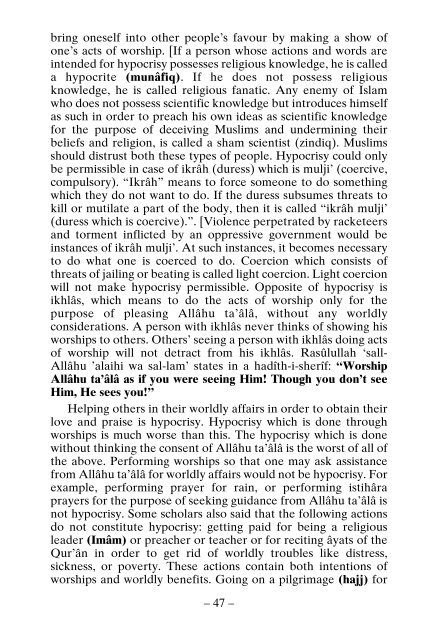Ethics of Islam
Ethics of Islam is taken from the book Berîka by Muhammad Hâdimi. Immorality and ways to get rid of it; 40 depravities and cures to them; usefulness of ethics; what is a soul; strengths of a soul; Personalities emanating from wisdom, courage, chastity and justice are extensively explained.
Ethics of Islam is taken from the book Berîka by Muhammad Hâdimi. Immorality and ways to get rid of it; 40 depravities and cures to them; usefulness of ethics; what is a soul; strengths of a soul; Personalities emanating from wisdom, courage, chastity and justice are extensively explained.
Create successful ePaper yourself
Turn your PDF publications into a flip-book with our unique Google optimized e-Paper software.
ing oneself into other people’s favour by making a show <strong>of</strong><br />
one’s acts <strong>of</strong> worship. [If a person whose actions and words are<br />
intended for hypocrisy possesses religious knowledge, he is called<br />
a hypocrite (munâfiq). If he does not possess religious<br />
knowledge, he is called religious fanatic. Any enemy <strong>of</strong> <strong>Islam</strong><br />
who does not possess scientific knowledge but introduces himself<br />
as such in order to preach his own ideas as scientific knowledge<br />
for the purpose <strong>of</strong> deceiving Muslims and undermining their<br />
beliefs and religion, is called a sham scientist (zindiq). Muslims<br />
should distrust both these types <strong>of</strong> people. Hypocrisy could only<br />
be permissible in case <strong>of</strong> ikrâh (duress) which is mulji’ (coercive,<br />
compulsory). “Ikrâh” means to force someone to do something<br />
which they do not want to do. If the duress subsumes threats to<br />
kill or mutilate a part <strong>of</strong> the body, then it is called “ikrâh mulji’<br />
(duress which is coercive).”. [Violence perpetrated by racketeers<br />
and torment inflicted by an oppressive government would be<br />
instances <strong>of</strong> ikrâh mulji’. At such instances, it becomes necessary<br />
to do what one is coerced to do. Coercion which consists <strong>of</strong><br />
threats <strong>of</strong> jailing or beating is called light coercion. Light coercion<br />
will not make hypocrisy permissible. Opposite <strong>of</strong> hypocrisy is<br />
ikhlâs, which means to do the acts <strong>of</strong> worship only for the<br />
purpose <strong>of</strong> pleasing Allâhu ta’âlâ, without any worldly<br />
considerations. A person with ikhlâs never thinks <strong>of</strong> showing his<br />
worships to others. Others’ seeing a person with ikhlâs doing acts<br />
<strong>of</strong> worship will not detract from his ikhlâs. Rasûlullah ‘sall-<br />
Allâhu ’alaihi wa sal-lam’ states in a hadîth-i-sherîf: “Worship<br />
Allâhu ta’âlâ as if you were seeing Him! Though you don’t see<br />
Him, He sees you!”<br />
Helping others in their worldly affairs in order to obtain their<br />
love and praise is hypocrisy. Hypocrisy which is done through<br />
worships is much worse than this. The hypocrisy which is done<br />
without thinking the consent <strong>of</strong> Allâhu ta’âlâ is the worst <strong>of</strong> all <strong>of</strong><br />
the above. Performing worships so that one may ask assistance<br />
from Allâhu ta’âlâ for worldly affairs would not be hypocrisy. For<br />
example, performing prayer for rain, or performing istihâra<br />
prayers for the purpose <strong>of</strong> seeking guidance from Allâhu ta’âlâ is<br />
not hypocrisy. Some scholars also said that the following actions<br />
do not constitute hypocrisy: getting paid for being a religious<br />
leader (Imâm) or preacher or teacher or for reciting âyats <strong>of</strong> the<br />
Qur’ân in order to get rid <strong>of</strong> worldly troubles like distress,<br />
sickness, or poverty. These actions contain both intentions <strong>of</strong><br />
worships and worldly benefits. Going on a pilgrimage (hajj) for<br />
– 47 –

















